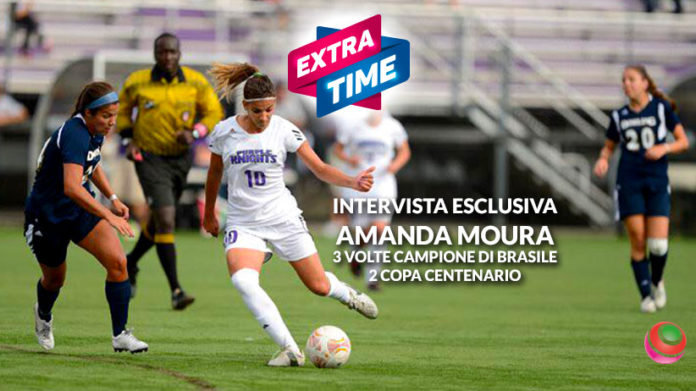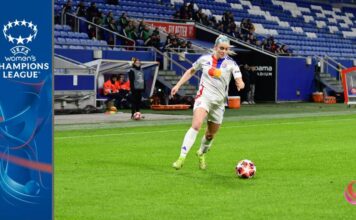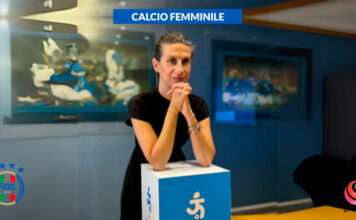“Sono nata e cresciuta in Brasile, un paese che non favorisce le calciatrici in nessun modo, siano esse professioniste o meno. Durante la mia carriera da professionista, infatti, ho dovuto affrontare molte difficoltà prima di raggiungere il successo. Ho iniziato ad allenarmi a 3 anni in una squadra maschile, perché non avevo una squadra femminile in cui giocare. A differenza dei ragazzi, dovevo cambiarmi in macchina e non nello spogliatoio e ho dovuto affrontare molti genitori arrabbiati, che mi odiavano perché a causa mia i loro figli sedevano in panchina.
Ma quell’esperienza è stata fondamentale per la mia carriera: mi ha insegnato come giocare un gioco veloce ed intelligente e come proteggere la palla da giocatori più forti fisicamente di me. Non avere una squadra femminile con cui allenarmi e l’aver sofferto i tanti pregiudizi delle persone mi ha portato a pensare alle altre ragazze, alle difficoltà che stavano affrontando e se potevo far qualcosa per aiutarle a raggiungere il loro sogno più facilmente di quanto abbia dovuto fare io. Ero molto giovane ma già volevo cambiare il mondo del calcio femminile”. È così che Amanda Moura si è presentata a noi di Calcio Femminile Italiano.
Il tuo palmares è fantastico, 3 volte campione di Brasile e per 2 volte hai vinto la Copa centenario con l’Atletico Mineiro dal 2008 al 2012. Come è stata la tua esperienza da professionista? Oltre ad essere ricca di successi sul campo.
Nonostante giocassi in una delle squadre più importanti del Brasile, non mi sentivo pienamente parte del progetto, perché non avevamo il 2% della paga degli uomini e ci allenavamo in un campo lontano dal loro quartier generale. Era come rappresentare un’illusione. Ho assaggiato i migliori campionati, l’uniforme e, a volte, la fama, ma alla fine della giornata sapevo che solo noi giocatrici avremmo apprezzato noi stesse e che avremmo giocato solo per passione per molti anni. La mancanza di sostegno, la mancanza di salari adeguati e la mancanza di strutture per allenarsi aumentarono il mio desiderio di cambiare la realtà dei campionati professionistici femminili. L’Atlético Mineiro è stato un periodo molto importante della mia vita per capire i problemi e per comprendere meglio le necessità del nostro calcio femminile. Dopo quattro anni da professionista, arrivò il momento di decidere se volevo continuare a giocare o se volevo studiare, e ho scelto di andare nel posto migliore del mondo per fare entrambe le cose: gli Stati Uniti.
E riguardo alla tua esperienza negli Stati Uniti?
Negli Stati Uniti è dove ho trovato me stessa, i miei valori, i miei obiettivi e quello che volevo fare per il resto della mia vita: portare questa straordinaria metodologia calcistica in Brasile. Già a livello universitario, ho imparato come dovrebbe essere un ambiente di calcio professionista, come dovrebbero essere trattate le calciatrici e quale sia il tipo di supporto essenziale per praticare sport a livello competitivo. Prima di tutto, i giocatori possono ottenere una borsa di studio grazie al loro talento e possono competere in una lega nazionale. In secondo luogo, incontrano diverse persone da tutto il mondo. L’approccio giusto a questa multiculturalità diventa è essenziale per migliorare sul campo e nella vita quotidiana.
Con il diploma alleato alla mia passione, ho scelto di dedicare la mia carriera al calcio fuori dal campo. Credo che Marta (Marta Viera da Silva) sia stata eletta cinque volte la miglior giocatrice al mondo, e anche dopo questo grande riconoscimento, non è stato fatto molto per migliorare la situazione in Brasile. Credo che abbiamo bisogno di più donne come manager, allenatori e leader per sviluppare il calcio femminile e portare più talenti come Marta a mostrarsi al mondo, invece di arrendersi.
L’articolo continua nella seconda parte.
ENGLISH VERSION
Face to face with Amanda Moura: “I believe we need more women as managers, coaches, and as leaders of new movements to develop women´s soccer“
“I am a native Brazilian, born and raised in a prejudiced country that does not favour women in any levels of soccer, for that I have experienced difficulties and success from my youth to professional clubs. I started playing at age of 3 only with boys because I did not have a girls’ team to play. Differently from the boys, I had to change my uniform in the car, not in a locker room and I faced many angry parents hating me inside the field because I put their kids in the bench. But that experience was crucial to my career: it taught me how to play a fast and smart game and how to protect the ball from players stronger than me. Socially speaking, not having a female team and suffering prejudice lead me to worry for how other girls were being treated and if they could pursue their dreams with more ease than I had. I was very young when I already wanted to change realities in soccer.” This is how Amanda introduced herself to CFI.
Your Palmàres is amazing, 3 times State Champion and 2 times Champion of Copa Centenario with Atletico MG from 2008 to 2012. How was your experience as a Pro? Besides being successful on the pitch.
Despite representing a very traditional team in Brazil, I did not feel fully part of the program because we did not have 2% of the men´s wage and we practiced in a far-away field from their headquarters. It was like representing an illusion. I tasted the best championships, the uniform, and sometimes the fame, but in the end of the day I knew only us players would value ourselves and we would play for passion for many years. Lack of support, lack of proper salaries, and lack of practice facilities grew a desire to change the reality of women´s professional leagues. Atlético Mineiro was a very important period of my life to recognize problems and list them for my future impact. After four years as a pro, came that time to decide whether to play or study, and I chose to go to the best place in the world to do both: United States.
What about your experience in USA?
In USA is where I found myself, my values, my goals, and what I wanted to do for the rest of my life: bring that amazing soccer methodology to Brazil. At University level already, I have learned how a proper soccer environment should be, how women´s soccer players should be treated and what kind of support was essential for the sport to be at a competitive level. First of all, players can get full tuitions because of their talents, and they can compete all around the states. Second, they meet different perspectives from all around the world, global cultures that are brought up to the field and to the daily life to teach new drills, new game visions, and new skills. It is all consequence of the enormous number of players from countries interested in playing overseas and how well U.S host its athletic immigrants.
With my graduation allied to my passion, I chose to dedicate my career to Soccer outside the field. I believe we have Marta (Marta Viera da Silva) who was elected five times the Best Player in the World, and even thought nothing much was done to Brazil after that. I believe we need more women as managers, coaches, and as leaders of new movements to develop women´s soccer and led more talents like Marta to be shown.
The interview continues in the next article.






